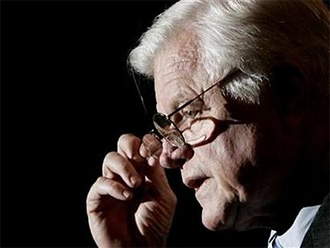
|  |  |  Editorials | Opinions | August 2009 Editorials | Opinions | August 2009  
Triumphs and Tragedies of Ted Kennedy
 Dale McFeatters - Capitol Hill Blue Dale McFeatters - Capitol Hill Blue
go to original
August 27, 2009


| | Sen. Ted Kennedy: He was a very good legislator |  |
It is not a stretch to say that if Sen. Edward M. Kennedy had not been stricken last year with the brain cancer that ultimately took his life, President Obama would have a health-care bill, one very likely on the verge of Senate passage. He was that good a legislator.

There were very few major pieces of legislation over the last 47 years that did not bear the Massachusetts Democrat's touch, in large part because he was more than willing to work with his Republican colleagues.

He was a co-sponsor of President Bush's signature No Child Left Behind Act. White House National Security Adviser Gen. James Jones recalled that Kennedy was instrumental in winning passage in 1986 of the Goldwater-Nichols Act, a sweeping reform and reorganization of the military, not normally thought of as an area of Kennedy's expertise. The Goldwater in the bill's name was Sen. Barry Goldwater, the patron saint of modern GOP conservatism.

Kennedy's career was also a testament to the redemptive possibilities of American public life. Time after time, he recovered from the wounds of tragedy and scandal, many of them self-inflicted.

Most notoriously, in 1969 he drove off the bridge at Chappaquiddick, abandoning his young woman companion to drown. He survived politically - he was re-elected a year later with 62 percent of the vote - but the incident cost him his Senate leadership post. There were persistent tales of his drinking and womanizing that revived with a vengeance in 1991 when a nephew was charged with rape at the family's Palm Beach, Fla., compound. Kennedy's reputation was not enhanced when it came out that he had roused his son and the nephew to go out drinking with him.

Following these gaffes and such tragedies as the deaths of his brothers, his own near-death in a plane crash, the death of his nephew, John Kennedy Jr., and his divorce, he typically returned to the Senate and redoubled his efforts as a lawmaker.

His role as a man of the Senate was perhaps cast for good in 1980 when he ran unsuccessfully for president, his campaign derailed at the outset by his sputtering inability to answer a reporter's simple question, "Senator, why do you want to be president?" Perhaps, in his heart, he didn't. He ran because it was expected of him.

The Kennedys were an intensely competitive and ambitious Irish-Catholic family. In 1962, his brother John was president and his brother Robert was attorney general. That year, barely of the legal age of 30, he ran and won John Kennedy's old Senate seat, a post for which he had only the thinnest qualifications. But Ted Kennedy had a great capacity to grow and learn, even if the spur was often the cruelest or most embarrassing of circumstances.

History will remember him as the great liberal lion of the Senate, a lawmaker of surpassing skill. Passing universal health care would have been the pinnacle of his career, and it is another of his tragedies that the prize just eluded him. |

 |
|  |



